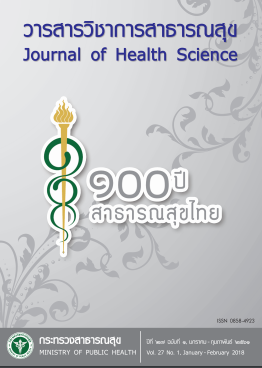Behavioral Development for Health Promotion with Regard to Food, Exercise, Emotion, Alcohol and Cigarette by Applying the Health Belief Model in Primary School Children
Keywords:
behavior, health promotion, health belief model theoryAbstract
This quasi experimental research study aimed to investigate the efficacy of the behavioral development for health promotion relating to food, exercise, emotion, alcohol consumption, and cigarette smok-ing, by applying the health belief model in primary school at Ban-Hanghong Prachautid School, Muang District, Sakon Nakhon Province. A total of 48 students were enrolled in this study. Quantitative and qualitative data were collected by using questionnaires; and were analyzed by descriptive statistics and paired sample t-test at the significance level of 0.05. It was found that the model had significantly increased the score on (1) knowledge associated with food, exercise, emotion, alcohol consumption, and cigarette smoking; (2) behavioral risks, (3) severity of the related diseases, (4) benefits of health promotion practices, (5) perception on practical constraints, and (6) the health promotion practices relating to food, exercise, emotion, alcohol consumption, and cigarette smoking (p<0.05). After the intervention, the primary school students had significantly improved health promotion behaviors.
Downloads
Downloads
Published
How to Cite
Issue
Section
License
Copyright (c) 2018 Journal of Health Science- วารสารวิชาการสาธารณสุข

This work is licensed under a Creative Commons Attribution-NonCommercial-NoDerivatives 4.0 International License.







